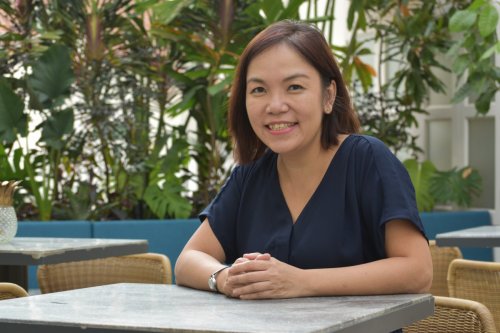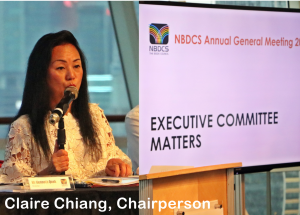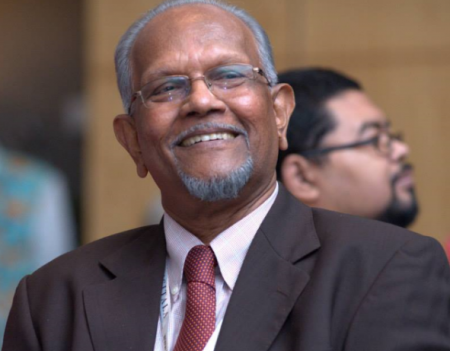By Luther Chuah
Diploma in Creative Writing for Television and New Media
Singapore Polytechnic
“When I see these young people, I say, ‘Why are you all even interested, how did you hear about the book?’”
Charmaine Leung, 45, the author of 17A Keong Saik Road, never expected her readers to be so young. The book is a memoir of her childhood and growing up with the stigma attached to her mother’s job as a brothel owner.
While she was prepared for the book to get attention for touching on a controversial topic, she anticipated that her audience would be mainly women in their thirties. The work, though, has also captured the imagination of younger Singaporeans.
“We were born into a place that was very new (Singapore),” she recalls one young reader explaining, “but we don’t really know our roots , we don’t know our heritage.”
Passing on a culture
Looking back, she realises that the book was not just about her childhood and detailing the happenings of an area that was once a famous red light district, but also about capturing Singapore’s history and culture.
“When I talked about it, it was more from the perspective of untold stories, the real stories of early immigrants. I think it’s the story of a community, of very amazing women, amazing individuals.”
When reflecting on the meaning of the book, Charmaine says that it was also about embracing change, rather than just dwelling on the past.
Chronicling Keong Saik Road
In fact, the book was motivated by change.
After living in Hong Kong for 15 years, returning to Singapore was a shock to Charmaine. Suddenly, there were a lot more people on the streets, and she felt troubled over the loss of familiar places in her homeland. Her struggle to re-adjust to life in Singapore was the inspiration for writing the book.

Growing up, Charmaine Leung lived with the stigma attached to her mother’s job as a brothel owner (Photo Credit: Luther Chuah)
Her original intention was to have something to keep and pass between family and friends. But the draft impressed her friends so much that they urged her to get it published. Her mother eventually came around to the idea of this story being told.
Although it was painful to walk down memory lane, Charmaine says she felt the need to write out her thoughts, as journaling had been her escape since childhood. Now, after positive reactions from her audience, she feels liberated from the stigma she and her mother had endured over the years. It was like a weight had been lifted off her mother’s shoulders, she says.
“I could see the change in her as well, realising that what you think or perceive may or may not be what others are thinking.”
By Audrey Chan Li Yi
Diploma in Creative Writing for TV and New Media
Singapore Polytechnic
Andrew Koh’s contributions to Singapore’s arts scene make for impressive reading. He is a founding member of The Necessary Stage theatre company and his 1994 novella, Glass Cathedral, won the Singapore Literature Prize Commendation Award. It’s the first gay-themed novella to be given official recognition in the country.
Andrew recalls being “very happy” to receive the award considering homosexuality was on the margins of society at that time and was viewed as shameful.
“Definitely, a taboo was brought within social structures …and at the very least we need to rethink this,” he says. “If we don’t question our assumptions of what’s good and what’s bad, we are going to be in deep trouble, because it’s then so easy to move into extremes.”
Although he broke new ground with his literary work in his younger days, 53-year-old Andrew’s creative writing is on the backburner for now. He is a practitioner of traditional Chinese medicine in Australia and a PhD candidate.
“My mental space at the moment is very much on academic writing,” he said. He does express a desire though to get back to literary writing.
Andrew has also lived away from Singapore since Glass Cathedral was published nearly a quarter of a century ago. He laments the rapid pace of modernisation in Singapore and the physical changes he encounters whenever he returns to visit family. His old school is now a museum, he says, and the field that the school band used to march on is gone. He says “a deep sense of history” is missing and his take is that this is one of the key reasons why many Singaporeans don’t feel rooted here.
Andrew acknowledges that there needs to be change in order to make progress. “But if we do that at breakneck speed and not have some sense of retaining the markers of our history,” he cautions, “We will end up not knowing who we are.”
Tackling Uncomfortable Subjects
As he has been away from Singapore for so long, Andrew is reluctant to make any decisive comments on the changes in the local arts scene from the days when he was active here. But he notes that literary works do not just passively reflect what society is, they must also educate and lead. To that end, he asks if the country is confident and secure and open enough to allow people to write about things that may cause discomfort.
“There are limits, I agree,” he says. “But can you widen those limits rather than narrow them? If we are constantly clamping down because we are uncomfortable with some of the things that are written, we will never progress culturally.”
Dear friends, I am calling it a day.
At the recent Annual General Meeting held on 14 July, my retirement as Executive Director (ED) from the National Book Development Council of Singapore (The Book Council) was announced by our Chairperson, Ms Claire Chiang. My last day with the organisation is on 31 July 2017.
Kenneth Quek will be the Acting ED, from that date. Claire has also announced the appointment of Elizabeth Chew as the Director of Marketing, and the promotion of Carlo Pena and Prema Devi as Director of Programmes and Director of Training Divisions, respectively. This team is an excellent group of youthful, passionate and highly motivated professionals, and it has been both a joy and a learning experience to work with Claire and the management team who are now taking on leadership roles.

The Chairperson has also announced that the Book Council is planning to be reorganised as a Company Limited By Guarantee, and will be moving its premises to the Goodman Arts Centre on 1 September this year.
Claire’s leadership of the Book Council has been outstanding, and it has been very inspiring and motivational for both for the organisation and the industry. I see a great future for the Book Council during the next phase of its development, which I would like to term as the “Claire Chang era”.

Claire has kindly agreed to continue my services as an Adviser to the Book Council, for at least a year. My contact details will therefore remain the same.
At the same time, I will also begin other work associated with libraries, books, writing and publishing, in my own personal capacity. I have spent 50 years working in these industries, and I am happy to continue doing what I like the most, on a freelance basis. I would love to see Asian content grow and flourish, and become the content that the rest of world want and prefer to read and consume. Ultimately, I envision Singapore to be established as the literary hub of Asia. If all these are realised during my lifetime, it would be a dream come true.
To everyone in the library, literary and publishing communities, and to all our friends of the Book Council, a big thank-you for your kind and generous support all these years.

- Mr R Ramachandran ([email protected])
Executive Director, NBDCS



